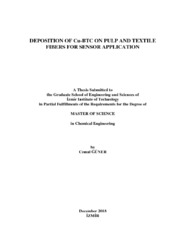Please use this identifier to cite or link to this item:
https://hdl.handle.net/11147/7168| Title: | Deposition of Cu-BTC on pulp and textile fibers for sensor application | Other Titles: | Sensör uygulaması için Cu-BTC'nin kağıt ve tekstil liflerinde biriktirilmesi | Authors: | Güner, Cemal | Advisors: | Çakıcıoğlu Özkan, Seher Fehime | Keywords: | Cu-BTC Pulp Fibers Cotton fabric Sensor applications |
Publisher: | Izmir Institute of Technology | Source: | Güner, C. (2018). Deposition of Cu-BTC on pulp and textile fibers for sensor application. Unpublished master's thesis, Izmir Institute of Technology, Izmir, Turkey | Abstract: | Cu-BTC is synthesized from Copper(II) nitrate and benzene-1,3,5-tricarboxylic acid and it is one of the most common metal organic framework which is used for catalysis, sensing, controlled release, separation and storage processes. The application areas of Cu-BTC could be increased by deposition on different surfaces. Cu-BTC is positively charged and to deposit Cu-BTC on a surface, the surface must have negative charge. The most common natural material with negative charge is cellulose. Raw pulp fibers, cotton and viscose fabrics are rich in terms of cellulose, so they were used as cellulose source. The aim in this study is to deposit Cu-BTC on pulp fibers, cotton and viscose fabrics and then, to investigate their sensing properties. In order to investigate whether Cu-BTC was deposited on cotton, pulp, and viscous fibers or not, a characterization study was carried out to investigate their properties. In this context, XRD, SEM, FT-IR, ATR-IR analysis were performed. As a result of the characterization study, it was concluded that the Cu-BTC was deposited on the pulp, cotton fibers, and viscous successfully. The Cu-BTC deposited substrates showed sensing activity against humidity and NH3 gas. Cu-BTC, Bakır (II) nitrat ve Benzen-1,3,5-trikarboksilik asitten sentezlenir ve kataliz, duyarlılık (belirli gazlara karşı), kontrollü salınım, ayırma ve depolama işlemleri için kullanılan en yaygın metal organik yapılardan biridir. Cu-BTC'nin uygulama alanları farklı yüzeylere tutturulmasıyla arttırılabilir. Cu-BTC pozitif yüklüdür ve bir yüzeyde Cu-BTC'nin tutunabilmesi için yüzeyin negatif yüklü olması gerekir. Negatif yüklü en yaygın doğal malzeme selülozdur. Ham kağıt hamuru lifleri, pamuk ve viskon kumaşlar selüloz açısından zengindir, bu nedenle selüloz kaynağı olarak kullanılmıştır. Bu çalışmada, Cu-BTC'nin pamuk, kağıt hamuru ve vorteks lifleri üzerine tutturulması amaçlanmış ve daha sonra asensör özellikleri araştırılmıştır. Cu-BTC'nin kağıt lifleri, pamuk ve viskon kumaşlar üzerinde tutunup tutunmadığını araştırmak ve özelliklerini araştırmak için bir karakterizasyon çalışması yapılmıştır. Bu kapsamda XRD, SEM, FT-IR, ATR-IR analizleri yapıldı. Karakterizasyon çalışması sonucunda, Cu-BTC'nin kağıt hamuru, pamuk ve viskon kumaşlar üzerinde başarılı bir şekilde tutunduğu sonucuna varılabilir. Cu-BTC tutunan bu malzemeler nem ve NH3 gazına karşı duyarlılık göstermiştir. |
Description: | Thesis (Master)--Izmir Institute of Technology, Chemical Engineering, Izmir, 2018 Includes bibliographical references (leaves: 50-53) Text in English; Abstract: Turkish and English |
URI: | https://hdl.handle.net/11147/7168 |
| Appears in Collections: | Master Degree / Yüksek Lisans Tezleri |
Files in This Item:
| File | Description | Size | Format | |
|---|---|---|---|---|
| T001847.pdf | MasterThesis | 4.59 MB | Adobe PDF |  View/Open |
CORE Recommender
Page view(s)
148
checked on Jul 22, 2024
Download(s)
136
checked on Jul 22, 2024
Google ScholarTM
Check
Items in GCRIS Repository are protected by copyright, with all rights reserved, unless otherwise indicated.